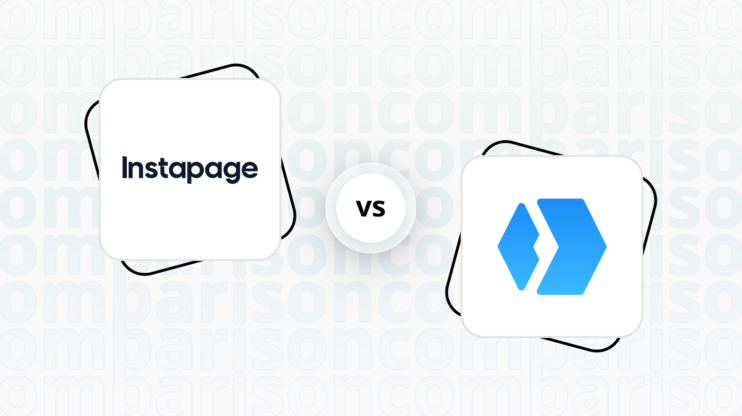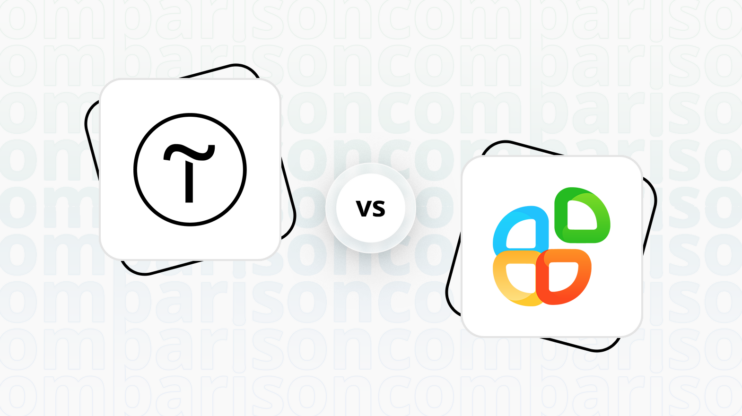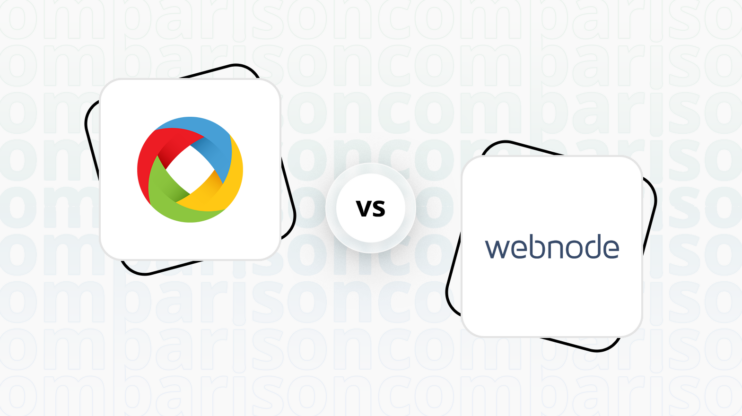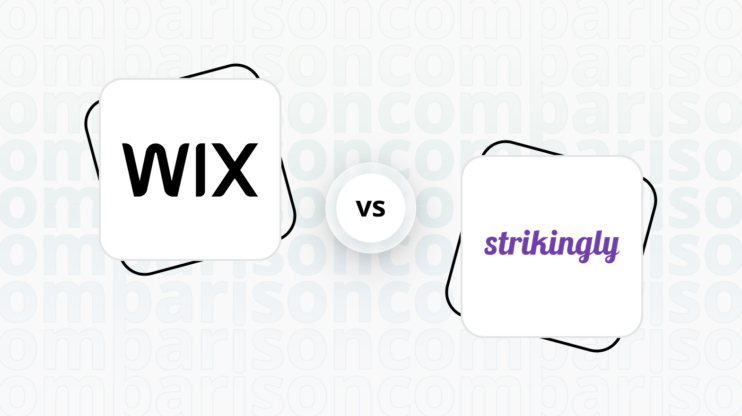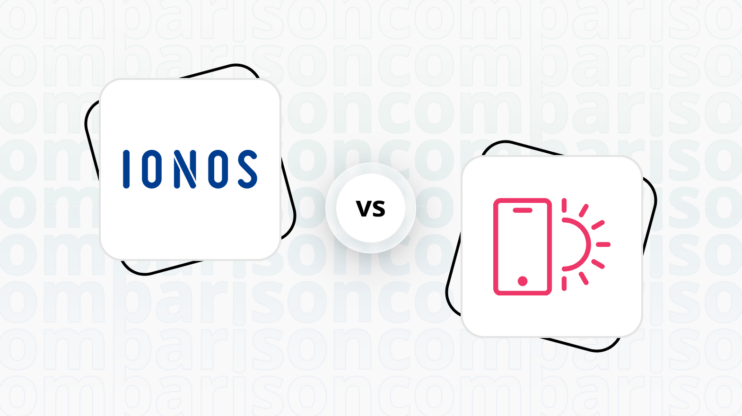Final verdict
iPage and Jimdo both offer user-friendly website building solutions, but they cater to different needs and preferences.
-
iPage (Overall Grade: 6.1/10)
is a versatile platform that combines web hosting and site building, making it a solid choice for small businesses and personal projects. It offers a range of templates, a drag-and-drop builder, and comprehensive hosting services. However, it falls short in advanced ecommerce functionalities and design flexibility compared to Jimdo. iPage’s partnership with Bluehost enhances its hosting capabilities, but its overall user experience and customization options are somewhat limited. -
Jimdo (Overall Grade: 7.2/10)
excels in ease of use and design flexibility, making it ideal for beginners and small businesses. Its AI-driven website builder, Jimdo Dolphin, simplifies the website creation process, while Jimdo Creator offers more customization options. Jimdo also outperforms iPage in ecommerce features, security, and AI capabilities. However, its hosting services are less comprehensive, and it may not be the best choice for users needing advanced hosting solutions.

|

|
|
|---|---|---|
|
Design functionalities & templates |
7.0 |
7.2 |
|
Ease of use |
7.6 |
8.0 |
|
Ecommerce |
5.7 |
7.0 |
|
Website Editors |
6.8 |
7.8 |
|
Product testing options |
2.5 |
6.4 |
|
Price |
7.3 |
7.5 |
|
Hosting quality |
7.7 |
6.7 |
|
Website speed optimization |
7.4 |
7.6 |
|
Plugins and integrations |
6.3 |
7.4 |
|
Marketing features |
7.2 |
7.2 |
|
Customer support |
6.9 |
6.8 |
|
Security |
7.5 |
8.3 |
|
AI capabilities |
3.0 |
6.0 |
|
User Management |
3.2 |
5.8 |
Best for ecommerce
 5.7
5.7
 7.0
7.0
Verdict
: Jimdo is better suited for ecommerce with a higher score of 7.0 compared to iPage’s 5.7, offering more robust features for online stores.
-
iPage
: iPage provides essential ecommerce functionalities such as inventory management, coupon codes, and PayPal integration. It is a good choice for small businesses and personal projects due to its user-friendly interface and comprehensive services. However, it may lack advanced customization and specialized ecommerce features compared to more dedicated platforms. -
Jimdo
: Jimdo excels with its user-friendly design and higher ecommerce score. It offers detailed product variations, no transaction fees, and effective email marketing tools. Jimdo’s templates are mobile-friendly and customizable, making it a strong contender for small to medium-sized businesses looking to establish an online presence.
Best for informational & business websites
 7.2
7.2
 7.4
7.4
Verdict
: When comparing iPage vs Jimdo, Jimdo slightly edges out iPage for informational and business websites due to its user-friendly interface, better design functionalities, and superior website speed optimization.
-
iPage
: iPage is a solid choice for small businesses and personal projects, offering a user-friendly web hosting and site builder platform. It provides a variety of templates and a drag-and-drop builder, making it accessible for users without technical expertise. However, its design options and website speed optimization are somewhat limited compared to Jimdo. iPage’s comprehensive hosting services and partnership with Bluehost enhance its appeal, but it may not be the best fit for those seeking advanced design flexibility. -
Jimdo
: Jimdo excels in creating visually appealing and easy-to-manage informational sites. Its AI-driven website builder, Jimdo Dolphin, simplifies the design process for beginners, while Jimdo Creator offers more customization options for advanced users. Jimdo’s focus on content optimization, CDN, and mobile responsive design ensures better website speed optimization. With a slightly higher score in design functionalities and templates, Jimdo is ideal for users looking for a straightforward and efficient website building experience.
Detailed comparison
Design functionalities & templates
Design FunctionalitiesRepresents how well each platform allows for creative design and customization of websites.Score Components:
- Template Variety (30%): Range and quality of design templates.
- Customization (30%): Flexibility and options for design alterations.
- User Interface (20%): Ease and intuitiveness of the design process.
- Responsiveness (10%): Adaptability to different devices and screen sizes.
- Innovation (10%): Unique design features and tools.
 7.0
7.0
 7.2
7.2
Winner: Jimdo.
Although both platforms offer a variety of templates and designs, Jimdo edges out iPage with a slightly higher score in design functionalities and templates.
iPage offers a wide variety of templates and designs, catering to users with diverse needs and preferences. With hundreds of options available, ranging from simple and elegant to complex and dynamic, users can easily find a template that suits their specific project or business requirements. These templates are also customizable, allowing for a high degree of personalization in terms of layout, color schemes, and functionality.

On the other hand, Jimdo offers a diverse range of templates suitable for various industries and user preferences, with options to preview and select templates easily. The platform allows flexibility in changing templates for existing websites and also provides a “Blank Template” for custom designs, catering to both beginners and advanced users.
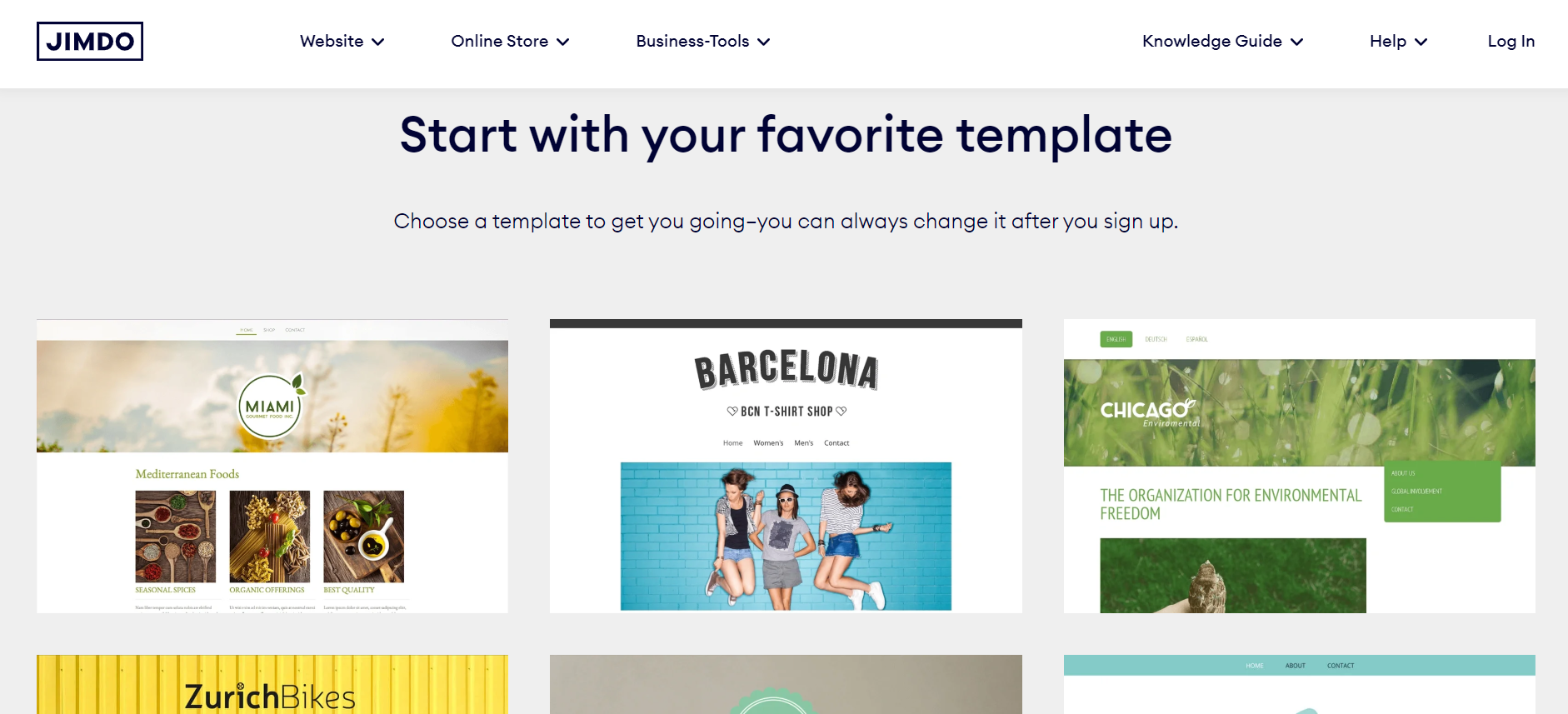

Get a head start on website creation with AI
Create a custom website tailored to your business needs 10X faster with 10Web AI Website Builder!
Ease of use
Ease of useReflects the platform’s overall user-friendliness.Score
Components:
- Learning curve (40%): Quickness and ease of getting started.
- Interface design (30%): Simplicity and intuitiveness of layout.
- User guidance (20%): Quality of tutorials and support.
- Flexibility (10%): Adaptability to various user skills.
 7.6
7.6
 8.0
8.0
🏆 Winner: Jimdo
. With a score of 8.0, Jimdo is praised for its user-friendly interface, particularly for beginners, thanks to its AI-driven website builder, Jimdo Dolphin. iPage, scoring 7.6, also offers a user-friendly experience, but some users may find the design options somewhat limited compared to more advanced website builders.
Learning Resources
🏆 Winner: iPage
. Both platforms offer solid learning resources, but iPage provides a comprehensive knowledge base, video tutorials, and step-by-step guides that cover a wide range of topics from basic website setup to more advanced features. Jimdo also offers user-friendly learning resources and tools, but the availability of direct, personalized support might vary, depending on the plan a user subscribes to.
For ecommerce
EcommerceMeasures the platform’s effectiveness in supporting online business activities.Score Components:
- Ecommerce themes and templates (20%): Variety and design of templates.
- Product management (25%): Ease of managing and organizing products.
- Payment options (25%): Variety and convenience of payment methods.
- Ecommerce features (20%): Features for managing an ecommerce store.
- Integration (10%): Compatibility with external e-commerce tools and services.
 5.7
5.7
 7.0
7.0
When it comes to ecommerce, both iPage and Jimdo offer a range of features suitable for small to medium-sized businesses. However, Jimdo scores slightly higher in this category with a score of 7.0 compared to iPage’s 5.7.

|

|
|
|---|---|---|
|
Ecommerce themes and templates |
5.5 |
6.5 |
|
Product page customization |
5.0 |
6.8 |
|
Payment processing and commissions |
6.0 |
7.5 |
|
POS capabilities |
3.0 |
5.0 |
|
Payment gateways |
6.5 |
7.0 |
|
Product numbers |
4.0 |
6.0 |
|
Additional ecommerce features |
5.5 |
6.5 |
iPage ecommerce features:
- Inventory Management and Tracking
- Coupon Codes and Promotions
- SEO Tools
- PayPal Integration
Jimdo ecommerce features:
- Product details and variations
- Inventory tracking
- No transaction fees
- Discount codes and promotions
- Email marketing
Ecommerce themes & templates
iPage offers a variety of ecommerce-specific templates designed to cater to online stores and businesses. These templates are integrated with features such as shopping carts, product catalogs, and payment processing options to facilitate online transactions. However, users might find some limitations in terms of customization and advanced ecommerce functionalities compared to specialized ecommerce platforms.
On the other hand, Jimdo’s ecommerce templates offer a diverse range of pre-designed themes, ensuring a mobile-friendly and smooth shopping experience. The drag-and-drop interface allows for easy customization of colors, fonts, and layouts, while templates focus on showcasing products with dedicated sections for images, descriptions, and clear calls to action.
Product page customization
iPage’s website builder offers a range of ecommerce product page customization options, allowing users to design their storefronts with various templates, adjust layouts, and incorporate multimedia elements like images and videos to showcase products. Users can also edit product descriptions, manage inventory, and set up different payment options. However, limitations may include less flexibility in advanced customization or coding for those who require unique, highly tailored functionalities beyond the provided templates and settings.
Customizing a product page on Jimdo involves using its user-friendly interface to personalize various elements. You can edit text, add images, adjust layouts, and modify design elements like colors and fonts to showcase your products effectively. This customization enhances the visual appeal and functionality of your online store, aiming to improve user experience and boost sales.
Payment processing
iPage supports several payment options for eCommerce, including major gateways like PayPal, Stripe, and others, catering to a wide range of currencies and countries. iPage does not charge commissions for transactions, commissions are charged by the gateways themselves.
Jimdo facilitates payment processing through various popular gateways like PayPal, Stripe, Mollie, and more, depending on your location and plan. While Jimdo doesn’t impose transaction fees, individual payment gateways may have their own charges, typically ranging from 2% to 3% of the transaction amount plus a fixed fee. Additionally, certain Jimdo plans may offer free transactions per month, providing flexibility for users based on their plan details.
Website Editors
Website EditorsEvaluates the platforms’ website building and editing capabilities.Score Components:
- Customization tools (40%): Range and power of editing features.
- Editor usability (30%): User experience within the editor.
- Design flexibility (20%): Freedom in layout and design changes.
- Update and maintenance ease (10%): Simplicity of updating and maintaining the site.
 6.8
6.8
 7.8
7.8
🏆
Winner: Jimdo
. Jimdo, with a score of 7.8, offers two main modes: Jimdo Dolphin and Jimdo Creator. Dolphin, an AI-driven tool, is ideal for beginners and creates websites based on user responses to a series of questions, streamlining the web design process. On the other hand, Jimdo Creator provides a more traditional website building experience with greater customization options, including a drag-and-drop editor and HTML widgets, catering to users seeking more control over their site’s design.
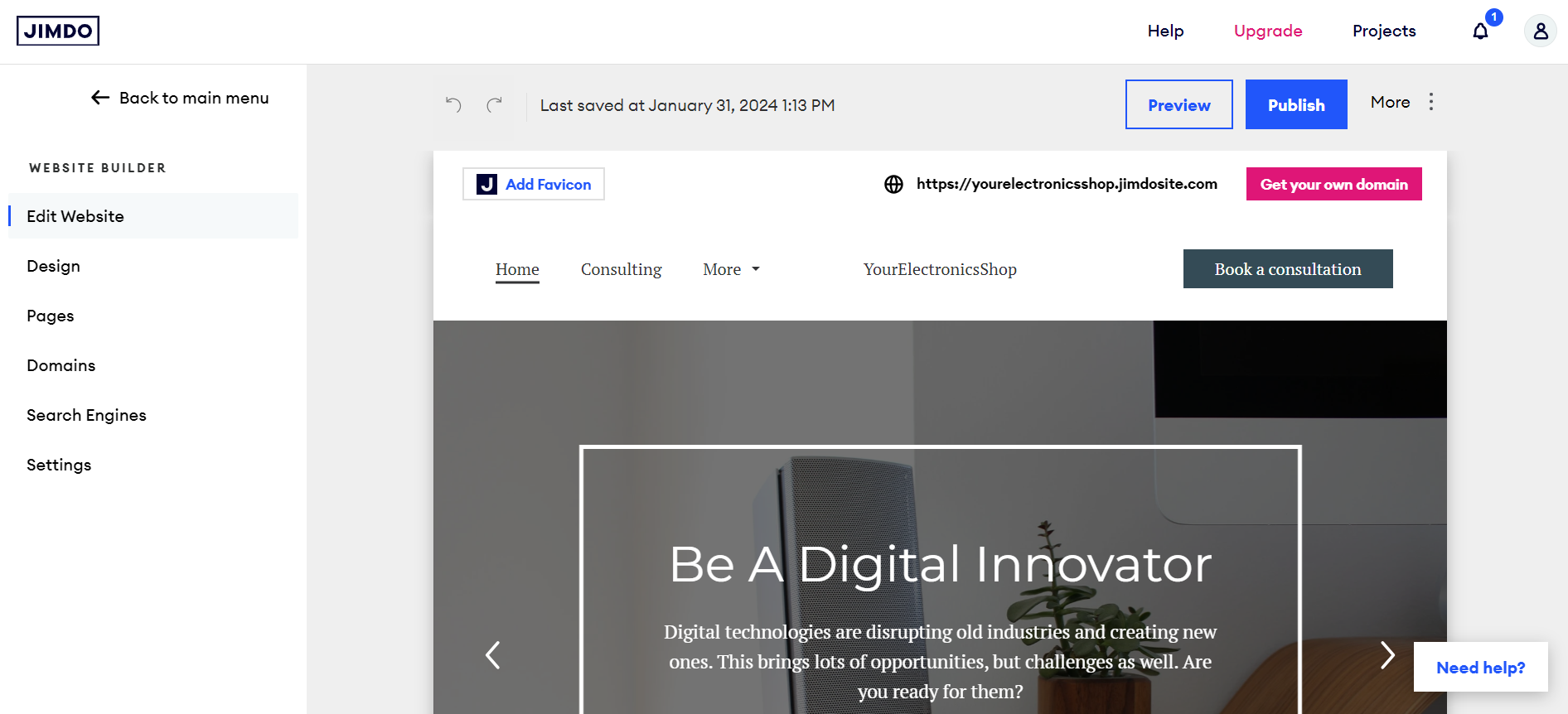
iPage’s editor, scoring 6.8, is designed for ease of use, catering to both beginners and those with some web design experience. It offers a drag-and-drop interface, allowing users to easily add, remove, and customize elements on their web pages without needing to code. Users can choose from a variety of templates that are responsive and customizable to fit their brand or personal style. Additionally, the editor includes features for adding social media links, integrating e-commerce functionalities, and optimizing for search engines, making it a versatile tool for creating a wide range of websites.
Mobile editor/app
 5.0
5.0
 8.0
8.0
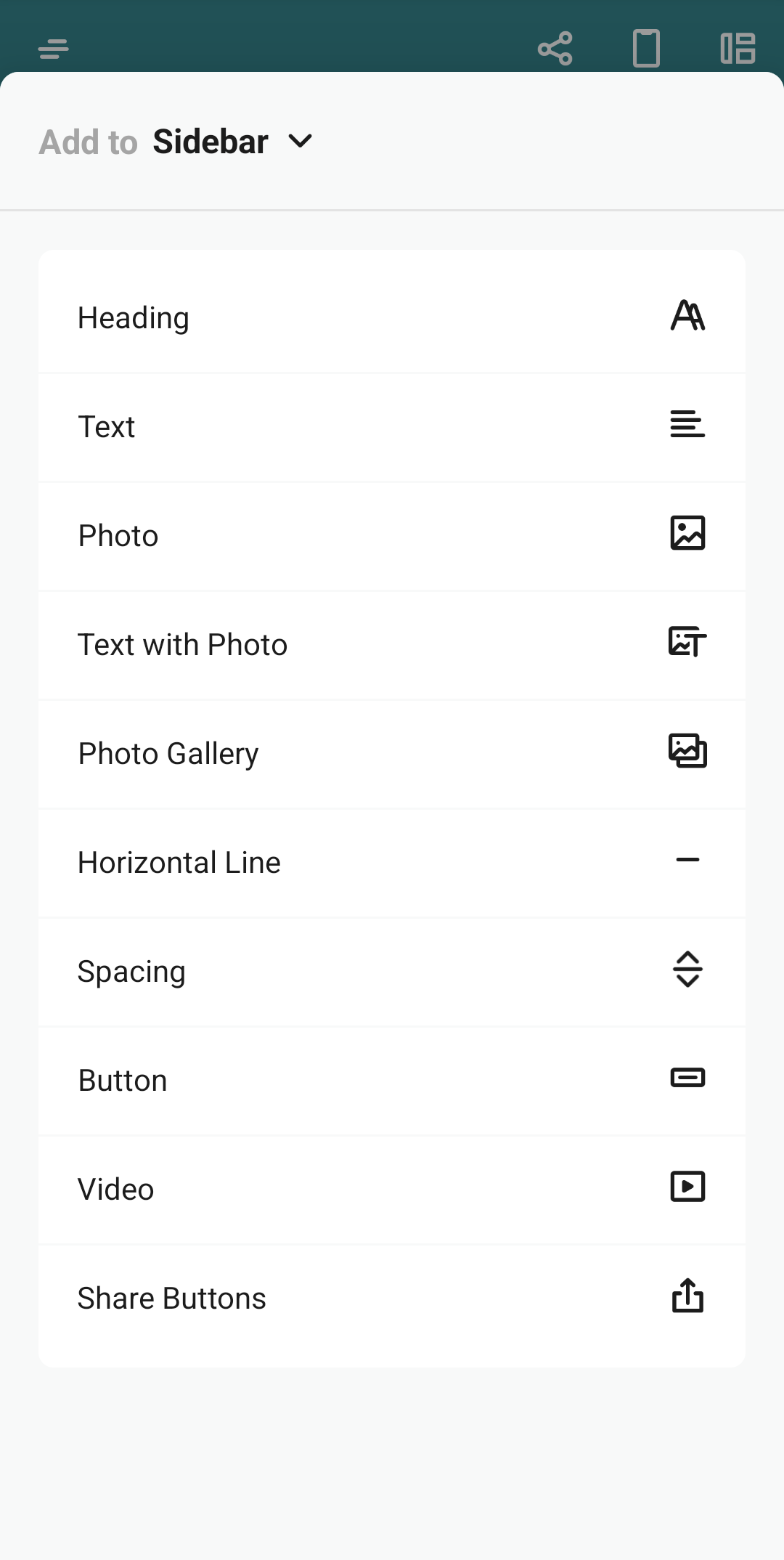
🏆
Winner: Jimdo
. Both iPage and Jimdo offer mobile editing capabilities, but they differ in their approach. iPage does not have a dedicated mobile editor app, but you can edit your website on a mobile browser, albeit with some limitations. This means that while you can make changes to your site on the go, the experience may not be as smooth or intuitive as using a desktop.
On the other hand, Jimdo offers a mobile editor app, allowing users to create and manage their websites directly from their smartphones or tablets. This app provides a convenient way to edit and update your site on the go, including adding or modifying content, adjusting design elements, and managing your online store. This makes Jimdo a more flexible and user-friendly option for mobile editing, earning it a higher score in this category.
In summary, Jimdo receives a higher rating due to its dedicated mobile editor app and user-friendly interface, while iPage allows mobile editing through a browser but may not provide as smooth or intuitive an experience.
Product testing options
Product Testing OptionsAssesses the options for trying out platform features before commitment.Score Components:
- Trial quality (40%): Extent and usefulness of the trial or free version.
- Feature accessibility (30%): How many features are available to test.
- Trial duration (20%): Length of the trial period.
- Ease of transition (10%): Smoothness of moving from trial to paid plans.
 2.5
2.5
 6.4
6.4
Overall Result
:
Jimdo wins
. Jimdo scores 6.4, significantly higher than iPage’s 2.5. Jimdo offers a free plan and a 14-day money-back guarantee for all paid plans, allowing users to test basic and advanced features. iPage, on the other hand, does not offer a free trial or free plan, but it does provide a 30-day refundable period for testing all features.

|

|
|
|---|---|---|
|
Free Plan |
No |
Yes |
|
Trial Duration |
No free trial |
No, but 14-day money-back guarantee |
|
Testing Premium Features |
All features during refundable period |
Basic features with free plan, advanced features with paid plans |
|
Money Back Guarantee |
30-day money back guarantee |
14-day money-back guarantee for all paid plans |
Price
PriceLooks at the cost-effectiveness and value for money of each platform.Score Components:
- Plan value (40%): What each pricing tier offers.
- Transparency and clarity (30%): Clearness of pricing structures.
- Flexibility of plans (20%): Range of options to suit different budgets.
- Hidden costs (10%): Additional expenses not included in the plan.
 7.3
7.3
 7.5
7.5
iPage and Jimdo have similar pricing scores, with Jimdo slightly ahead. Both offer a range of plans to suit different needs, but neither offers an enterprise plan.

|

|
|
|---|---|---|
|
Free |
No offering at this amount. |
Play ($0/month): Basic, entry-level plan offering limited features, ideal for testing Jimdo’s capabilities. Includes 500MB storage and up to 5 website pages. Limited ecommerce functionality. |
|
$0-$10 |
No offering at this amount. |
Start ($9/month): Aimed at small projects or businesses just starting out. Provides 5GB of storage and up to 10 website pages, along with SEO tools for online visibility. Not directly focused on ecommerce. Value for price: 6.0 |
|
$10-$17 |
Basic ($15.99/month): Simple website or blog, 1 website, 10 GB SSD, free domain, managed WordPress, free SSL for 1st year. Value for price: 6.5 |
Grow ($15/month): Targets growing businesses needing more space and features. Offers more flexibility but still lacks dedicated ecommerce capabilities compared to the Business plan. Provides 20GB bandwidth with up to 50 website pages. Value for price: 7.0 Basic ($15/month): Up to five forwarding email addresses, up to 10 website pages, convenient payment methods. Value for price: 6.5 |
|
$17-$30 |
Choice Plus ($27.99/month): Multiple sites with storage, security, backups, 3 websites, 40 GB SSD, daily backups, domain privacy, malware scanning. Value for price: 7.5 |
Business ($19/month): Designed for small to medium-sized online stores, offering ecommerce features without transaction fees. Includes selling on Facebook and Instagram, and various payment options. And up to 50 website pages. Value for price: 8.0 |
|
$30-$34 |
Online Store ($32.99/month): Online selling with eCommerce tools, 3 websites, 40 GB SSD, store features like unlimited products and secure payments. Value for price: 8.0 |
No offering at this amount. |
|
$34+ |
Pro ($34.99/month): High traffic sites, advanced storage, 5 websites, 100 GB SSD, optimized for high traffic, enhanced security and backups. Value for price: 9.0 |
VIP ($39/month): Provides comprehensive features for large or expanding online stores, including unlimited storage and priority support and unlimited website pages. Includes professional design review and no transaction fees. Value for price: 9.0 Unlimited ($39/month): Offers unlimited bandwidth and storage, up to 20 forwarding email addresses and unlimited website pages. Includes priority support and professional design reviews. Value for price: 9.5 |
location. As a result in rare cases the prices displayed here can differ from the ones you see on their
websites.
Hosting quality
Hosting
qualityExamines the reliability and performance of the hosting solutions.Score Components:
- Uptime (40%): Consistency and reliability of website availability.
- Speed (30%): Loading times and performance.
- Bandwidth and storage (20%): Sufficiency of resources provided.
- Data centers (10%): Quality and distribution of hosting infrastructure.
 7.7
7.7
 6.7
6.7
🏆
Winner: iPage
iPage offers a range of affordable hosting services including shared, WordPress, and VPS hosting, with unlimited storage and bandwidth for various website needs. Jimdo, on the other hand, provides shared, cloud, and managed hosting with storage and bandwidth limitations on lower-tier plans. iPage’s comprehensive hosting services and partnership with Bluehost give it an edge over Jimdo.

|

|
|
|---|---|---|
|
Do they offer hosting? |
Yes, included in all paid plans |
Yes, included in all paid plans, free plan with limited features |
|
Data Centers: |
2 data centers: US, Europe |
Jimdo doesn’t publicly disclose the exact locations of its data centers, they utilize a distributed network of highly secure and reliable facilities spread across multiple regions. |
|
Type of hosting: |
Managed WordPress Hosting |
Shared Hosting, Cloud Hosting, Managed Hosting |
|
Uptime: |
99.9% |
99.5% |
|
Uptime Guarantee: |
No |
No |
Website Speed Optimization
Website Speed OptimizationEvaluates optimization of website loading timesScore Components:
- PageSpeed Score (30%): Google’s score indicating performance optimization.
- Loading Time (30%): The average time until a website is fully interactive.
- Mobile Optimization (15%): Optimization effectiveness for mobile devices.
- Resource Optimization (15%): Optimizing images, scripts, and other heavy resources.
- CDN Usage (10%): Use of CDN to enhance speed across geolocations.
 7.4
7.4
 7.6
7.6
🏆 Winner: Jimdo
Both iPage and Jimdo prioritize website performance and page speed, with iPage focusing on web server optimizations, caching, CDN, database optimization, and SEO optimization, and Jimdo emphasizing content optimization, CDN, image optimization, caching, and mobile responsive design. However, Jimdo slightly outperforms iPage in terms of website speed optimization.

|

|
|
|---|---|---|
|
Focus |
Web Server optimizations, Caching, CDN, Database optimization, SEO optimization |
Content Optimization, CDN, Image optimization, Caching, Mobile Responsive design |
|
Performance Tools |
Google Lighthouse, PageSpeed Insights |
Google PageSpeed Insights Integration |
|
Key Strategies |
Web Server optimizations, Caching, CDN, Database optimization, SEO optimization |
Content Optimization, CDN, Image optimization, Caching, Mobile Responsive design |
|
Load Times |
2.6s average |
Varies widely, dependent on optimization |
|
Page Speed Scores Range |
72/100 average |
Scores vary; influenced by plugins, images |
|
Core Web Vitals Improvement |
LCP, FID, CLS improvements |
Optimizing LCP, Enhancing FID, Improving CLS |
iPage, a user-friendly web hosting and site builder platform, offers comprehensive services including hosting, domain registration, and e-commerce solutions. It focuses on web server optimizations, caching, CDN, database optimization, and SEO optimization to enhance website speed. The average load time for iPage is 2.6 seconds, and the average PageSpeed score is 72/100. iPage also emphasizes improvements in Core Web Vitals, including LCP, FID, and CLS.
On the other hand, Jimdo, a user-friendly website builder platform, stands out with its simplicity and ease of use. It prioritizes content optimization, CDN, image optimization, caching, and mobile responsive design for website speed optimization. The load times and PageSpeed scores for Jimdo vary widely, depending on optimization. Jimdo also focuses on optimizing LCP, enhancing FID, and improving CLS as part of its Core Web Vital improvements. Despite the close competition, Jimdo slightly outperforms iPage in terms of website speed optimization.
Get a head start on website creation with AI
Create a custom website tailored to your business needs 10X faster with 10Web AI Website Builder!
Plugins and integrations
Plugins and integrationsMeasures the range and effectiveness of additional plugins and integrations.Score Components:
- Variety of options (40%): Range of available add-ons.
- Integration smoothness (30%): Ease of integrating plugins into the site.
- Quality of plugins (20%): Functionality and reliability of the options.
- Custom integration capabilities (10%): Support for custom or third-party integrations.
 6.3
6.3
 7.4
7.4
🏆 Winner: Jimdo.
With a score of 7.4, Jimdo offers a wider range of plugins and extensions, including social media integration, ecommerce features, form builders, SEO tools, visual enhancements, marketing elements, customer reviews, event management, location tools, and various other functionalities. iPage, scoring 6.3, also offers a variety of plugins and extensions, but Jimdo’s breadth and depth give it the upper hand.
It is worth noting that both platforms offer a mix of free and paid plugins, allowing users to customize their websites according to their needs and budget.
Marketing Features
Design FunctionalitiesRepresents how well each platform allows for creative design and customization of websites.Score Components:
- Template Variety (30%): Range and quality of design templates.
- Customization (30%): Flexibility and options for design alterations.
- User Interface (20%): Ease and intuitiveness of the design process.
- Responsiveness (10%): Adaptability to different devices and screen sizes.
- Innovation (10%): Unique design features and tools.
 7.2
7.2
 7.2
7.2
🏆
Overall Winner: Tie
. Both iPage and Jimdo offer a comprehensive set of marketing features, including SEO tools, email marketing, blogging, social media integration, analytics and reporting, and ads and promotions. The choice between the two would depend on the specific needs of the user.

|

|
|
|---|---|---|
|
SEO Tools |
|
|
|
Email Marketing |
|
|
|
Blogging |
|
|
|
Social Media Integration |
Integrated social media buttons and features |
Integration features for various social media platforms |
|
Analytics and Reporting |
Option to integrate Google Analytics |
Integrated analytics for monitoring website traffic |
|
Ads and Promotions |
Offers SEO, social media integration, email marketing, and promotional discounts |
Tools and features for promotions, but detailed ad management may require external services |
Customer Support
Customer supportEvaluates the quality and availability of support options.Score Components:
- Response time (40%): Speed of support responses.
- Support quality (30%): Effectiveness and helpfulness of the support.
- Availability (20%): Range of support channels (phone, chat, email).
- Resource richness (10%): Quality of self-help and educational materials.
 6.9
6.9
 6.8
6.8
🏆 Winner: iPage
. In the iPage vs Jimdo comparison, iPage takes the lead with its 24/7 customer support availability. iPage offers support through phone, email, and live chat, ensuring that users can get assistance at any time, day or night. This round-the-clock support is particularly beneficial for users who may encounter issues outside of regular business hours.
Jimdo, on the other hand, provides a variety of support channels, including email, a call center, a comprehensive knowledge base, and social media support. However, it lacks live chat support, which can be a drawback for users seeking immediate assistance. Despite this, Jimdo’s support is still robust, with specific request forms and a helpful online community.
Security
SecurityLooks at the platforms’ security measures and data protection.Score Components:
- Data protection (40%): Safeguards for user and customer data.
- SSL and encryption (30%): Implementation of secure connections.
- Compliance (20%): Adherence to industry security standards.
- Regular updates (10%): Frequency of security updates and patches.
 7.5
7.5
 8.3
8.3
🏆
Winner: Jimdo
. Jimdo’s commitment to data protection and GDPR compliance, along with its use of AI for personalization without data training, IT security measures, and anonymized web analytics data, gives it an edge over iPage. Jimdo also ensures website and user security with a strong firewall, DDoS protection, HTTPS encryption for all traffic, TLS encryption for messages and emails, and SSL certificates for domains.
Although iPage offers robust security measures like Domain Privacy Protection and SiteLock, it falls slightly short in comparison. SiteLock, a comprehensive security suite offered by iPage, protects websites from malware, spam, and hackers. However, Jimdo’s broader approach to security and higher security score make it the winner in this category.
AI Capabilities
AI capabilitiesMeasures the effectiveness of AI-driven features and tools.Score Components:
- Automation efficiency (40%): Impact of AI on streamlining processes.
- Personalization (30%): AI-driven customization for users or customers.
- AI-Assisted design (20%): Role of AI in website design and functionality.
- Data analysis (10%): Use of AI in interpreting user data and analytics.
 3.0
3.0
 6.0
6.0

|

|
|
|---|---|---|
|
AI Builder |
Basic AI-powered website builder |
AI website builder with mobile-friendly designs and custom logo creation |
|
AI Ecommerce features |
|
AI-powered design suggestions for store layouts and image recommendations |
|
AI content generation |
|
|
|
Additional AI features |
Assists users in setting up their websites efficiently |
Guides users through website creation with pre-filled content and images |
🏆 Winner: Jimdo
. Jimdo, with a score of 6.0, offers a more comprehensive AI experience, particularly in its website builder and ecommerce features. Its AI capabilities, while basic, are integrated into its ecommerce features, providing design suggestions for store layouts and image recommendations.

iPage, with a score of 3.0, offers a basic AI-powered website builder. Its AI features are more focused on assisting users in setting up their websites efficiently rather than offering advanced AI content generation or sophisticated AI-driven design tools.
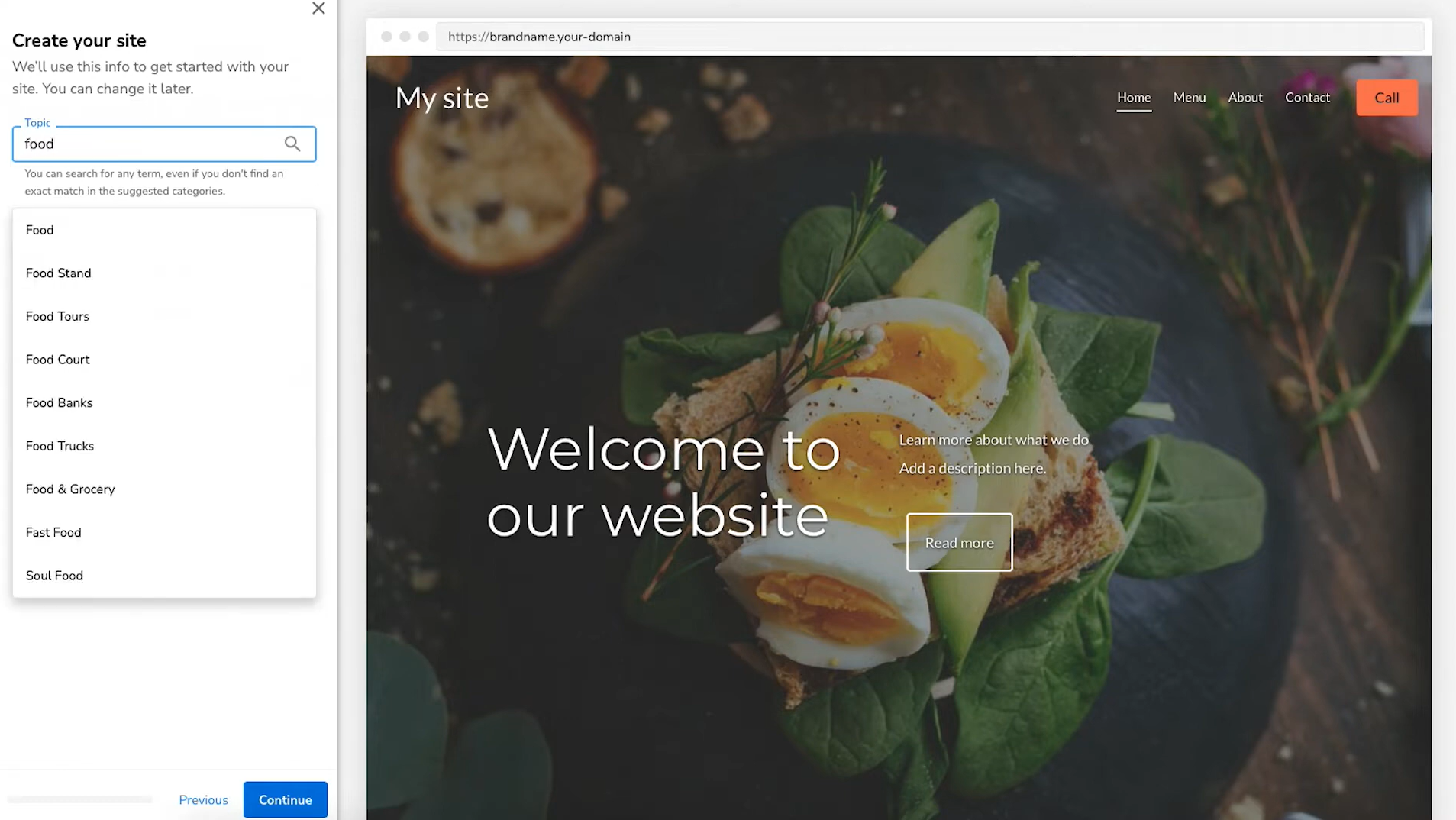
User Management
User ManagementAssesses the platforms’ capabilities in managing user roles, permissions, and accessibility.Score Components:
- Role Customization (40%): Flexibility in creating and defining user roles and
permissions. - Ease of Management (30%): User interface and tools for managing users.
- Access Control (20%): Effectiveness of access control measures for different user
levels. - Scalability (10%): Ability to manage a growing number of users efficiently.
 3.2
3.2
 5.8
5.8
🏆 Winner: Jimdo
. Both iPage and Jimdo have different approaches to user management.
- iPage’s website builder offers very limited multi-user functionality and access levels compared to more sophisticated website builder platforms.
- Jimdo’s Free, Start, and Basic Shop Plans allow website management by a single owner. The Grow Shop Plan permits two editors, including the account owner and one collaborator. The Business Plan extends collaboration to five editors, consisting of the account owner and four collaborators. The Unlimited Plan provides unlimited editors, fostering a collaborative team environment. The VIP Plan, designed for online stores, does not specify a limit on editors for websites.
Unfortunately, neither iPage nor Jimdo provide detailed information about user roles and access levels.
Additional Features

|

|
|
|---|---|---|
|
SSL Certificate |
|
|
|
Custom Domain |
|
|
|
Free Custom Domain Included |
|
|
|
International Domains |
|
|
|
Mobile Responsive |
|
|
|
Page Speed |
|
|
|
Website Builder Mobile App |
|
|
|
Convert a Website To An App |
|
|
|
Website Analytics |
|
|
|
Multilingual Sites |
|
|
|
Multiple Users |
|
|
User Feedback
Jimdo, a website builder platform, receives mixed reviews from users. Positive feedback highlights its ease of use, no-code editor, and quick website development for basic sites. However, criticisms include outdated design, limited templates, and concerns about pricing transparency. Some users appreciate it for simple projects, while others find it lacking for more complex websites. Common issues include restricted SEO in the free tier, support limitations, and late responses. The overall impression suggests Jimdo may suit beginners but could be less ideal for those seeking advanced features or modern designs.
In the comparison of iPage vs Jimdo, iPage does not have detailed user feedback available. However, iPage is known for its user-friendly web hosting and site builder platform, offering templates and a drag-and-drop builder to simplify website creation for those without technical expertise. This makes it a viable option for small businesses and personal projects, especially with its recent partnership with Bluehost to enhance hosting capabilities and pricing plans.
The making of this blog
We followed a clear, step-by-step process to write and research this article.
FAQ
Which platform is better for beginners, iPage or Jimdo?
Can I use both iPage and Jimdo for ecommerce?
How do iPage and Jimdo compare in terms of design flexibility and customization?
What are the major differences in pricing between iPage and Jimdo?
Which platform offers better customer support, iPage or Jimdo?










